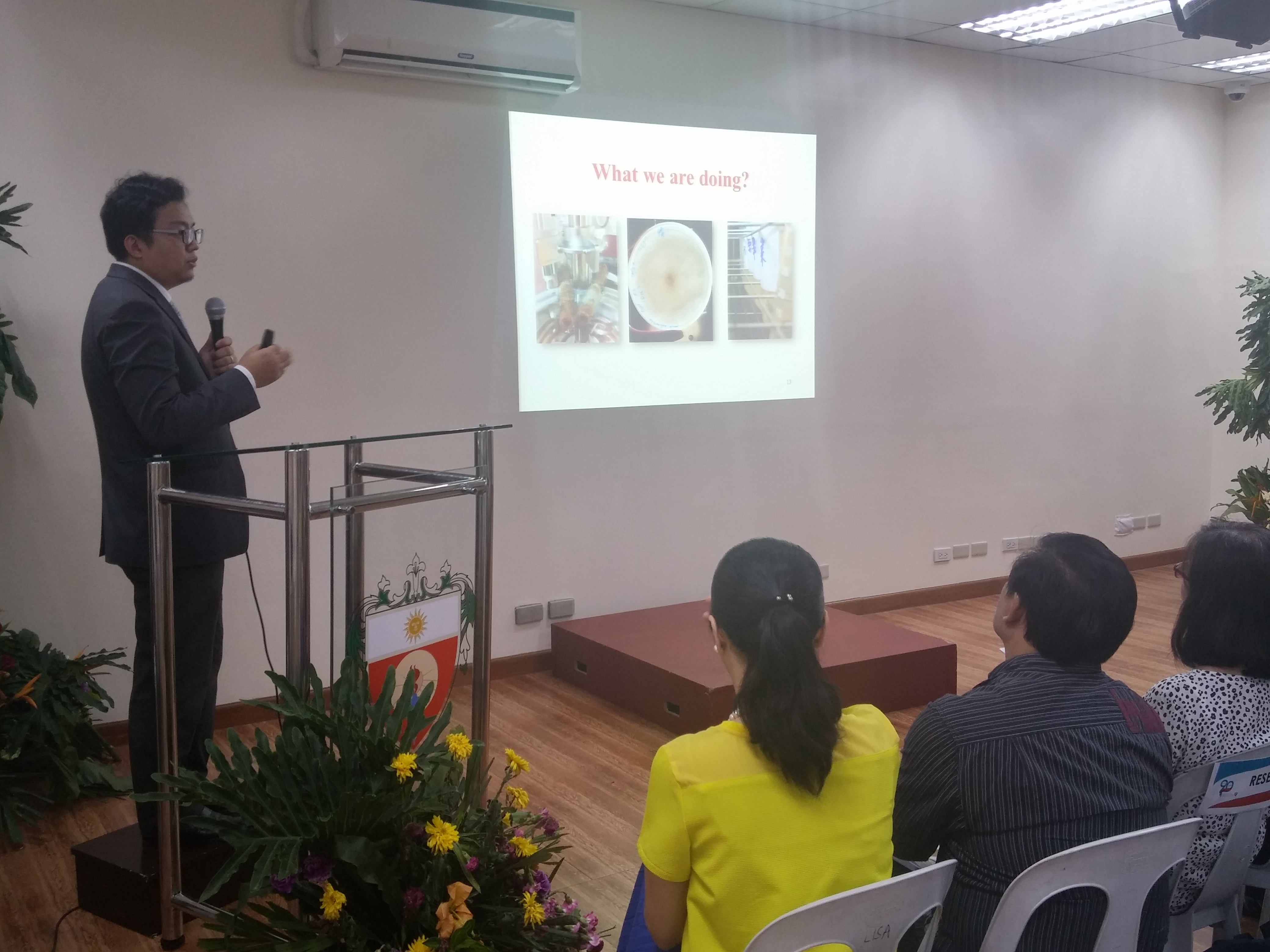

Dr. Cheng explains their current research undertakings
In support of the thrust of the University of Santo Tomas towards internationalization, the College of Education through its Food Technology Department, sponsored a colloquy on food fermentation on April 20, 2016 at the Special Education Room, Albertus Magnus Building. Around 150 food technology students and faculty members attended the colloquy. Dr. Kuan-Chen Cheng, an associate professor at the Graduate Institute of Food Science and Technology/ Institute of Biotechnology, National Taiwan University was invited to speak about current trends and practices in food fermentation. Cheng holds a doctorate degree in Agricultural and Biological Engineering at the Pennsylvania State University.
In his presentation entitled, “Recent advances for polysaccharides production by using
immobilized system”, Cheng talked about cellulose, one of the most abundant polysaccharides on earth, which can be acquired from plants, microorganisms, and animals. He pointed out that although plant cellulose (PC) and bacterial cellulose (BC) possess the same molecular structure, BC exhibits the unique physical properties at nanoscale network and does not require extra processing steps to remove impurities such as lignin, pectin, and hemicellulose. He concluded that the PCS rotating disk bioreactor system can be used to produce bacterial cellulose in pellicle form with enhanced productivity which can be scaled up easily to meet commercial needs.
Cheng also spoke with 35 food science graduate and undergraduate students in an evening lecture entitled, “Submerged cultivation of Ganoderma formosanum and its bioactivity”. This was held at the Board room of the Thomas Aquinas Research Complex and attended by participants from UST and the Colegio de San Juan de Letran. Dr. Cheng spoke about a medical mushroom called Lingzhi (Ganoderma spp.) which is generally recognized as safe (GRAS) by the Food and Drug Administration and has been used for centuries as a nutraceutical to promote health and longevity. Ganoderma formosanum is an endemic species of Ganoderma in Taiwan. Owing to its novelty, few studies had demonstrated its pharmacological potential, among which the investigation of bioactive extracellular polysaccharide (EPS) is most understood. Because of the global market size of 2.5 billion U.S. dollars, more researchers are now into Ganoderma. Cheng also explained that polysaccharide is one of the major components contributing to health benefits of Ganoderma spp, including immune-modulation, anti-inflammation and obesity management. Production of the polysaccharide is now a trend.
During his discussion, Cheng showed how extracellular polysaccharide fraction from the submerged cultivation of G. formosanum, was able to stimulate macrophage activation in mice. Simply put, Ganoderma exerted anti-tumor effect towards melanoma, adenocarcinoma and sarcoma in mice without adverse effects.
The UST Food Technology Department is currently exploring the possibility of establishing a memorandum of understanding with the National Taiwan University. A group of 18 food technology students together with 3 faculty members led by the Food Technology Chairperson Assoc. Prof. Evelyn O. Ladines, visited the National Taiwan University during their program enhancement tour from March 3-6, 2016. They also had a tour of the campus of Fu Jen Catholic University. They had the opportunity to look at the laboratory facilities of the National Taiwan Ocean University; check out the analytical laboratories and processing equipment of Grape King Bio plant, and observe the food safety practices being implemented inside the processing plant of Vigor Kobo Pineapple Cake Factory.